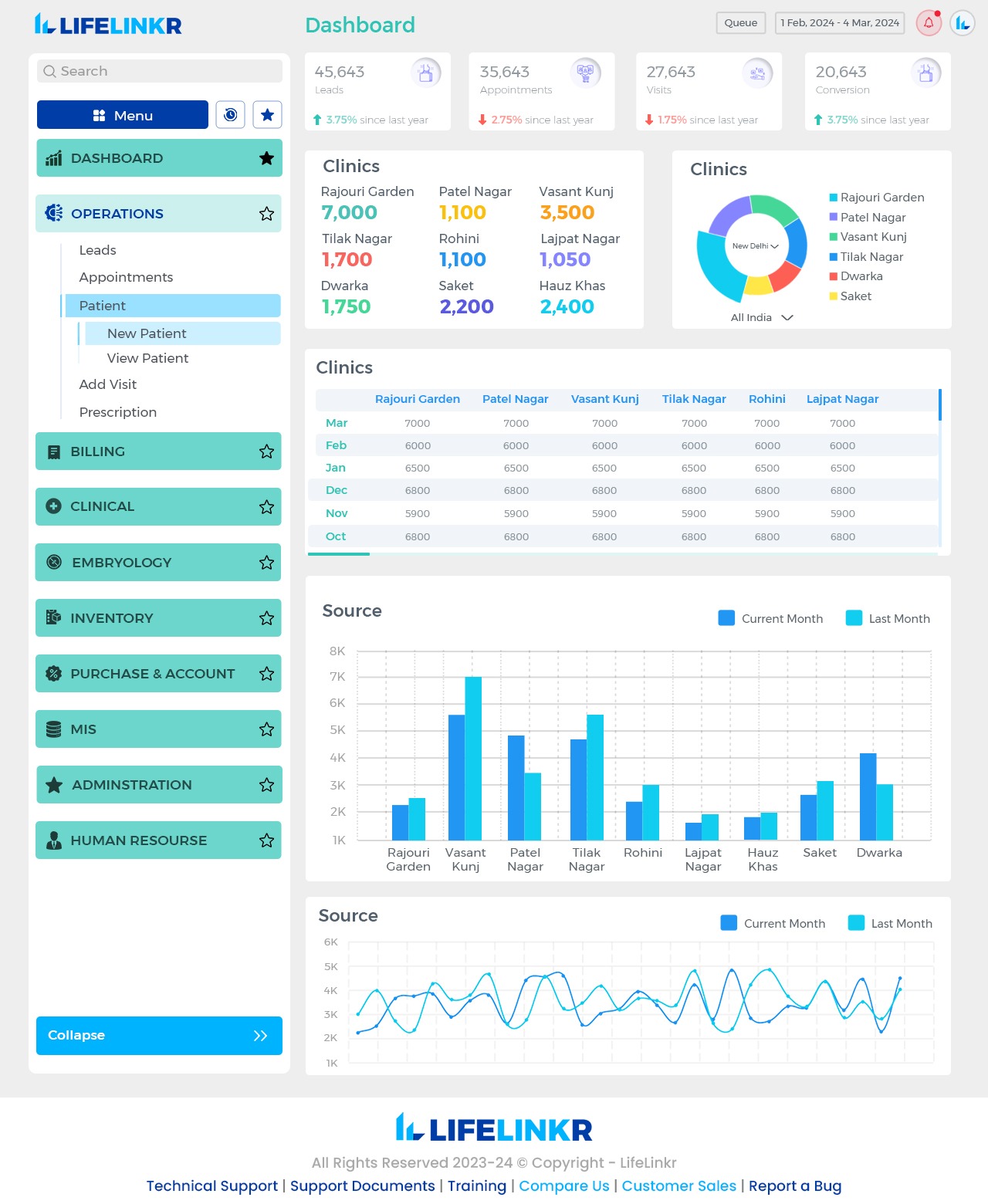Table of Contents
-
Introduction
-
The Essential Role of All-in-One IVF Software
-
Key Features that Simplify IVF Clinic Management
-
Patient Management and Scheduling
-
Lab and Sample Tracking
-
Billing and Financial Tracking
-
Inventory Management and Control
-
Secure Data and Compliance
-
Reporting and Insights
-
Transforming IVF Clinics: Benefits of an All-in-One System
-
Best Practices for Implementing All-in-One IVF Solutions
-
Real-Life Testimonial
-
Common Questions (FAQs)
-
Conclusion
1. Introduction

In today’s healthcare landscape, efficiency and accuracy are paramount, especially in specialized fields like fertility care. All-in-One IVF Software offers a powerful solution that combines all essential functions of clinic management into a single platform. With centralized tools that enhance workflow, manage patient care, and maintain compliance, clinics can focus more on delivering quality care and less on administrative tasks.
2. The Essential Role of All-in-One IVF Software
For fertility clinics, managing patient information, scheduling, billing, and lab operations can be incredibly complex. An all-in-one system is designed to streamline these critical functions, creating a cohesive process that is accessible and easy to manage. By consolidating various functions, clinics benefit from time savings, reduced errors, and an improved experience for both patients and staff.
3. Key Features that Simplify IVF Clinic Management
The functionality of all-in-one solutions lies in their ability to seamlessly integrate various aspects of clinic operations. Let’s explore some of the primary features and their impact:
Patient Management and Scheduling
Patient management and scheduling lie at the core of fertility care. An integrated system offers a streamlined approach, where staff can easily access patient records, update treatment schedules, and manage appointments. Key elements include:
- Efficient Appointment Booking: Patients can book appointments through an online portal, minimizing phone traffic and manual scheduling errors.
- Automated Reminders: Notifications are sent to patients and staff, reducing missed appointments.
- Unified Patient Records: All relevant details are available in one place, from initial consultation notes to ongoing treatment updates.
These features ensure that all parties remain informed, organized, and up-to-date, ultimately improving patient experience and clinic workflow.
Lab and Sample Tracking
In IVF clinics, managing samples with accuracy is essential for patient outcomes. All-in-one systems offer tools that enable complete traceability of each sample, ensuring accuracy and compliance. Some lab-specific features include:
- Barcode Integration: Each sample is assigned a unique barcode, which can be scanned for quick and accurate identification.
- Real-Time Updates: Staff can access the status and location of each sample, ensuring clear oversight throughout its journey.
- Alerts for Urgent Actions: Automated notifications alert staff to specific actions, such as when a sample needs testing or when conditions change.
This level of control over sample handling provides confidence in the accuracy of lab work, supporting the clinic’s reputation and patient trust.
Billing and Financial Tracking
Billing in fertility care involves complex billing codes, insurance claims, and patient payments. An all-in-one system simplifies this by automating billing processes and offering transparent tracking. Main features include:
- Automated Invoices: Generates itemized invoices that include treatments, medications, and lab fees, reducing manual errors.
- Payment Tracking: Tracks outstanding and completed payments, allowing staff to follow up with patients as needed.
- Insurance Integration: Manages claims and provides updates, simplifying a process that can otherwise be time-consuming and prone to errors.
This not only reduces administrative burden but also supports the financial health of the clinic.
Inventory Management and Control
Managing the inventory of medications, lab supplies, and equipment can be challenging, especially when considering expiration dates and storage conditions. With an integrated system, clinics gain better oversight and control over inventory. Key functionalities include:
- Real-Time Inventory Monitoring: Tracks supply levels in real-time and sends alerts when items run low.
- Automated Reordering: Orders are automatically generated when stock reaches a predefined threshold, ensuring that supplies are consistently available.
- Expiration Date Alerts: Notifies staff when items near their expiration, preventing waste and ensuring compliance with safety standards.
By automating inventory management, clinics can focus on care delivery without interruptions due to supply shortages.
Secure Data and Compliance
Data security and regulatory compliance are of utmost importance in healthcare. A comprehensive platform ensures that patient information is stored securely and access is granted only to authorized staff. Features include:
- Encryption and Access Control: Protects patient data from unauthorized access, meeting HIPAA and other compliance standards.
- Audit Trails: Logs every access or modification to patient records, supporting both transparency and accountability.
- Regular Data Backups: Ensures that information is securely stored, with backup systems that prevent data loss.
This level of security is essential for patient trust and clinic reputation, assuring patients that their personal information is handled with care.
Reporting and Insights
Reporting and analytics provide clinics with valuable insights into operations, helping staff make data-driven decisions. Detailed reports can be generated on various metrics, such as:
- Patient Demographics and Outcomes: Analyzes success rates and demographics to support improvements in patient care.
- Financial Performance: Tracks revenue sources and identifies trends, aiding in financial planning.
- Inventory and Resource Use: Monitors supply usage to enhance inventory control and resource allocation.
With access to these insights, clinics can continuously refine operations and make informed decisions that improve patient care and clinic performance.
4. Transforming IVF Clinics: Benefits of an All-in-One System

Adopting an all-in-one approach offers numerous benefits that extend beyond simple administrative efficiency:
- Time Savings
The consolidation of various functions reduces the need for multiple software tools, allowing staff to access all necessary data in one place. - Increased Accuracy
Automated features eliminate many of the common errors associated with manual data entry, such as patient billing discrepancies and scheduling conflicts. - Improved Patient Satisfaction
Patients benefit from faster responses, transparent billing, and easy access to their treatment plans, enhancing their overall experience. - Enhanced Collaboration
With a unified system, clinic staff can collaborate more effectively, sharing access to up-to-date information and reducing delays in patient care.
5. Best Practices for Implementing All-in-One IVF Solutions
To maximize the benefits of an all-in-one system, IVF clinics should consider a strategic approach to implementation:
- Comprehensive Training for Staff: Ensuring all team members are proficient in using the new system is crucial for smooth operation.
- Incremental Integration: Introduce each feature gradually, allowing staff to adapt to changes without overwhelming them.
- Continuous Monitoring and Feedback: Regularly review system performance and gather staff feedback to make necessary adjustments.
Following these practices ensures that the system functions optimally, supporting the clinic’s objectives while minimizing any disruption.
6. Real-Life Testimonial
“Implementing an all-in-one solution has transformed our clinic operations. From managing patient records to scheduling and billing, everything is much simpler and more efficient. Our team is able to focus more on patient care, and our patients are more satisfied.” – Dr. Anne Harper, Director, Family First Fertility Clinic
7. Common Questions (FAQs)
- What is All-in-One IVF Software?
It’s an integrated platform that combines multiple clinic management functions, from patient management to billing, in one system. - How does it benefit patient care?
By reducing administrative tasks, staff can devote more time to direct patient care, improving overall patient satisfaction. - Does it support regulatory compliance?
Yes, it includes features like encryption, access controls, and audit trails to meet industry standards. - How is it different from standalone software?
Unlike separate tools, an all-in-one platform centralizes functions, improving accessibility and workflow efficiency. - Is it suitable for small and large clinics?
Yes, it’s scalable and adaptable to the unique needs of clinics of all sizes.
8. Conclusion
All-in-one IVF software solutions like LifeLinkr help fertility clinics streamline operations, save time, and enhance patient care. By integrating scheduling, lab management, billing, and reporting functions, LifeLinkr’s platform empowers clinics to focus on what truly matters: delivering high-quality, compassionate care to patients.

